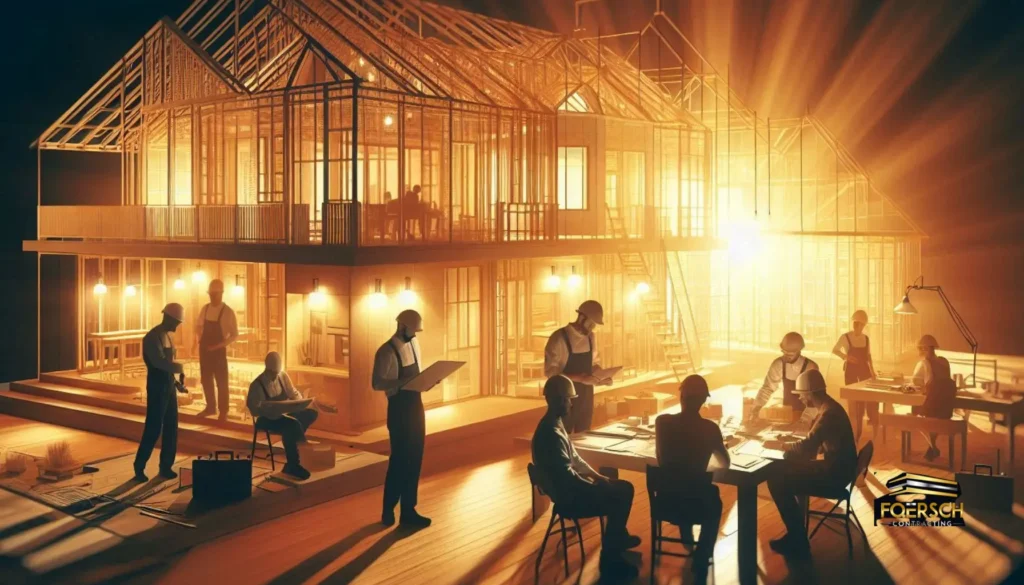Construction Services offered by Construction companies and individuals undertaking residential and commercial construction projects need to understand the types of contracting services when starting with the project. This guide will explain the contracting services that matter most to enable you to decide to acquire the right contracting services for your project.
Understanding Contracting Services

Contracting services are a broad category that includes any services related to construction and alteration undertakings. Depending on the size of the project, the nature of the work that needs to be done, and the client’s needs, these services can range from essential to complex.
Types of Contracting Services
In the next section, I’ll describe and explain the significant types of contracting services commonly employed in residential and commercial construction. These two types are different from each other, and each has its benefits, which are allied with its possible drawbacks and the field where it can be most effective.
1. General Contracting Services
Indeed, general contracting services are highly demanded in the construction business. Among the construction services, the following is the most demanded:
Key Responsibilities:
- To Hire and manage subcontractors.
- Purchasing materials and products and ensuring that these materials or products have been supplied at the right time.
- Most importantly, the coordination/management of enforcing and other planned programmes and events occur and progress as intended.
- It entails interaction with the client and any other other parties that may be involved in the process.
- To satisfy the legal requirements of the structures and other laws inherent in the country’s building standards.
Pros:
- This means that general contractors can always fully control the process, whirelievinge client of most possibilities.
- They maintain good relationships with their subcontractors and suppliers of raw materials.
- It also includes all aspects associated with user operations that would require a lot of time and effort from the clients.
Cons:
- In this critical area, the general contractors will be more expensive than if you had begun the project yourself.
- Consequently, clients have little influence over almost all the events that pertain to that project.
When to Use:
General contracting services are best suited to any client who does not wish to be involved in construction for a particular project. They may be instrumental, particularly in significant and complex contracts, where it may be very annoying for the client to deal with various subcontractors and suppliers.
2. Design-Build Contracting Services
Design-build contracting integrates a project’s design with its construction under a single contract agreement. The client contracts with one architectural design and construction contractor in this model. This approach benefits designers and builders since it can help eliminate unnecessary misunderstandings.
Key Responsibilities:
- The organisation’s general plan is to provide a single contact point for the design and construction processes.
- Ensures all client requirements, time, and financial constraints are met.
- Coordinate the construction process to achieve design objectives set out in the project.
Pros:
- Projects are realised in a shorter time due to merging the design and construction phases.
- There is less likelihood of misunderstanding between designers and builders during the implementation of different projects, which may lead to time wastage or mistakes.
- It is easier to do business as it eliminates issues such as project management and dealing with various people for various issues.
Cons:
- Selecting materials may also be more restricted because the client may need more say in who the subcontractors are.
- Implementing changes mid-project is quite complex and costly compared to those planned from the very beginning of the project.
When to Use:
The design-build Foersch contracting services are apt to provide for those clients who do not require frequent project monitoring. This service is most helpful in cases where time is an important issue, including business property modifications or dwelling constructions that have been placed on a quick schedule.
3. Construction Management Services
A construction management service means engaging a construction manager to organise, coordinate and supervise the construction of a building. Construction managers perform their operations independently rather than affiliating themselves with other construction businesses as most general contractors do, and they usually execute all responsibilities from planning to the construction phase or the completion of the construction phase of the construction process for the construction client.
Key Responsibilities:
- Helped with project design and estimated costs.
- Outline activities that involve working with architects, engineers, and subcontractors.
- Coordinate the processes involved in construction to deliver what the client wants.
- To Monitor and control the project schedule and the economic sources of the project.
Pros:
- The client has more control over the project, and they have the final say on who to hire as subcontractors and which suppliers to purchase materials from.
- Another typical duty of construction managers is a specific orientation to value engineering, which allows them to minimise construction costs.
- They remain part of the project from inception to the completion phase, thereby ensuring the stability of the project.
Cons:
- The client may be required to be more engaged in the decision-making and management of the company’s affairs.
- The construction manager is an extra cost a contractor will likely incur in the construction project.
When to Use:
Construction management services are particularly suitable for owners who wish to participate in the project. A primary benefit of this service is that it is most valuable for significant commercial developments and other large construction projects that demand tremendous planning and scheduling.
4. Subcontracting Services
Some services include outsourcing some of the construction project subtasks to other contractors in a similar project but outside the main contractor’s category. This is often in skilled work where, for specific tasks, individuals are most familiar with tools used in a particular project, such as plumbing, electrical, roof, or installation of an HVAC system. As a rule, GC/CM establishes its staff or hires subcontractors to perform the project.
Key Responsibilities:
- Performing some particular operations in their professional field.
- Engaging the general contractor or construction manager in their project is necessary.
- Ensure that its work meets the constraints of the project and the prescribed construction code.
Pros:
- It develops bench strength whereby subcontractors contribute value by applying special skills to the project.
- These projects sometimes can be best and efficiently done by organisations and in a shorter time than when a general contractor.
- Subcontracting is more flexible and less rigid for the organisation regarding scheduling and the general control of the work in progress, coupled with completing some project phases.
Cons:
- It can be cumbersome and time-consuming, especially when many subcontractors are involved in large projects.
- The problem with this type of project is always organisational since subcontractors manage the project.
When to Use:
Outsourcing services are essential in any construction project, especially where specific expertise is required. Whether constructing a residential or commercial building, these subcontractors ensure that certain portions of the work are done only by specialists, enhancing the quality of the work.
Choosing the Right Contracting Service for Your Project
Here are some key considerations to help you make the right choice
1. Project Size and Complexity:
General contracting or construction management services are preferred for large and complex constructions. These services include supervisory services that include many intensive supervisory activities and general administrative supervision to increase the efficiency of resource management.
2. Budget Constraints:
If you have a cash logistics problem, I suggest that some of the work be delegated to someone else while you handle the other part of the project. Thus, although one may agree that this approach can help workers save their money even if it means they are employed in the working process more clients.
3. Desired Level of Involvement:
Choose the level to which you wish to be associated with the direction of the work to be done daily. If you can not or will not commit the time and interest in getting involved in the process and getting involved in many decisions, then general contracting or design build services may be for you. But if one prefers to have significantly more influence in the PMC or if subcontracting services seem more reachable, then.
4. Expertise Required:
Sometimes, assessing the level of specialisation required in the project is possible. Subcontracting services are critical every time specialised skills are required. If the specialisation of skills required and the level of coordination needed are low, the general contractor or construction manager may be selected.
Wrap Up:
It is crucial to have adequate knowledge of contracting services available to obtain the one most relevant to a particular construction project, whether a home construction or an office block construction. Every contracting service has benefits; therefore, the type most suitable for a specific project is uniquely appropriate. In this way, knowing project size, complexity, available funds, and time constraints makes it possible to choose the most appropriate contracting service and guarantee successful project completion.
FAQS
1. What should I consider when choosing a contracting service?
Consider project size, complexity, budget, desired level of involvement, required expertise, and timeline.
2. Can I use different contracting services for one project?
You can combine services like hiring a general contractor and specialised subcontractors for different tasks.
3. When is a design-build service the best choice?
Choose design-build for streamlined processes, single-point contact, and projects with tight timelines.












